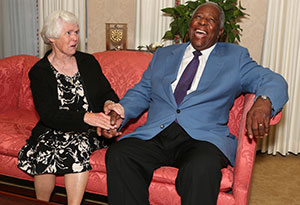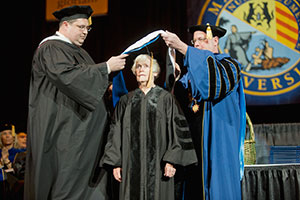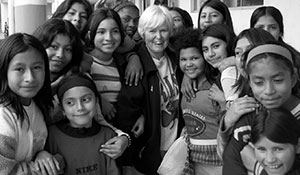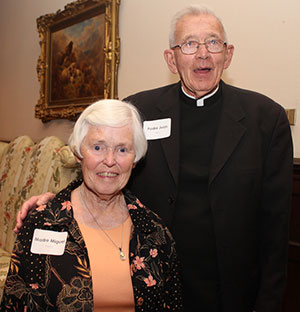ELM GROVE — What had she gotten herself into, Sr. Mary Miguel Conway wondered, as she stood in shock in the attic of a Jesuit church in Quito, Ecuador, in 1967.
 Baseball great Henry Aaron and Sister of the Blessed Virgin Mary, Mary Miguel Conway share a laugh Saturday, May 19. Marquette University honored Aaron and Sr. Miguel with honorary doctor of humane letters degrees during the university’s 131st commencement ceremony on May 20. (Marquette University photo by Dan Johnson)For years, the Boone, Iowa, native felt pulled to mission work and was thrilled when her community, the Sisters of the Blessed Virgin Mary, sent her to help a young Jesuit priest who wrote to the community desperate for help with his fledging mission in Ecuador’s second most populous city.
Baseball great Henry Aaron and Sister of the Blessed Virgin Mary, Mary Miguel Conway share a laugh Saturday, May 19. Marquette University honored Aaron and Sr. Miguel with honorary doctor of humane letters degrees during the university’s 131st commencement ceremony on May 20. (Marquette University photo by Dan Johnson)For years, the Boone, Iowa, native felt pulled to mission work and was thrilled when her community, the Sisters of the Blessed Virgin Mary, sent her to help a young Jesuit priest who wrote to the community desperate for help with his fledging mission in Ecuador’s second most populous city.
But this?
To her, this looked like a big, old attic with nothing but a dining room table, a kitchen set up in a tiny corner and a huge pile of sand in the middle of the floor.
It was a mess, she decided, even after the young priest told her the pile of sand was to build a bathroom for the center, which served Quito’s impoverished street kids.
“I took one look from one end of the place to another, and after I had looked, I remember (the priest) saying, ‘You know, the tables are new, at least you could say that you liked them,’” recounted Sr. Miguel about her introduction to the center and its founder, Jesuit Fr. John Halligan.
The bathroom building project was the first of many projects on which the two have partnered in the 45 years that have followed at the helm of the Working Boys’ Center.
Straightening out Padre’s ‘mess’
The way she recounts the early years now, Madre Miguel, as she’s known to the thousands of center families and volunteers, discovered Padre Juan making a mess of things until she arrived to help straighten him out.
Padre has a slightly different recollection. For example, some of her reforms, such as starting a Christmas Club savings program for the kids “ruined Christmas” for them, he said, noting, “I was happy and independent before I met her. I am no longer that.”
Describing her as a “terror,” he said, “I think she thinks God died and put her in charge.”
The good-natured bantering between Padre and Madre is couched in affection and illustrates the family atmosphere the two have created at the center for thousands of people, according to her sister, Patricia Parks, a member of St. Mary Parish, Elm Grove.
Becomes Doctor Miguel
Madre Miguel was in Milwaukee in mid-May and was awarded a doctor of humane letters degree during Marquette University’s commencement ceremony on May 20.
In 1989, Padre Juan was similarly honored by Marquette University with an honorary doctorate, but according to Madre Miguel, he likes to brag that he got his first and his status is being diminished because they’re handing them out to people like her.
Kidding aside, the two have partnered over the years to create a center that has served more than 6,000 families or about 30,000 people, allowing them to leave poverty forever, according to center brochures. The Working Boys’ Center is described on the brochure “as a transformation program equipping 400 families a year with self-reliance skills that empower the entire family to move from poverty to prosperity through values-based education and training in high-demand trades.”
When Padre Juan wrote to numerous religious orders in the late 1960s asking for help, he had a vision and a plan partly in place. He had been sent by the Jesuits to Quito to work with the street kids who were often the breadwinners in their families.
“I dreamed of going on to a lot of things, but there I was with 250 kids, and it was absolutely too clear, I was doing something wrong,” he said to your Catholic Herald in an interview May 17 at the Parks’ home.
“I couldn’t bring up kids; it takes a woman,” said Padre Juan, describing his situation as “beyond hopelessness.”
Original vision was Padre’s
When Madre Miguel arrived, she found that Padre Juan had already set up a system where the children received one meal a day and that he had started a shoemaking project and had a little going in the areas of carpentry and dentistry.
 Madre Miguel Conway is “hooded” by Tom MacKinnon, left, and Marquette president Jesuit Fr. Scott Pilarz, during Marquette University commencement ceremonies at the Bradley Center, May 20. (Marquette University photo by Dan Johnson)“He had started a number of programs and I confess the vision was his of what it eventually would become,” admitted Madre Miguel, explaining she helped put into action and refined some of his many ideas.
Madre Miguel Conway is “hooded” by Tom MacKinnon, left, and Marquette president Jesuit Fr. Scott Pilarz, during Marquette University commencement ceremonies at the Bradley Center, May 20. (Marquette University photo by Dan Johnson)“He had started a number of programs and I confess the vision was his of what it eventually would become,” admitted Madre Miguel, explaining she helped put into action and refined some of his many ideas.
For example, originally her task was to travel the area to make sure the boys were in school. By the end of the first year, she determined it would be much more convenient for them to start their own school, rather than her running around the city trying to find out if the kids had been attending the various schools.
Today, the center – which expanded to a second location in 1991 – educates children as young as preschool through technical school. In fact, its technical school was named the best in Ecuador in 1997, 2005 and 2007. Three meals are offered daily, along with a health care program, dental care and job training in baking, toy making, industrial sewing, cosmetology, sales and marketing and health promotion.
“Everything we do is an answer to a felt need,” explained Madre Miguel as she relaxed on the couch in her sister’s home. “We see a need and create it and try to keep it like a family at all times.”
Unique approach to poverty
Padre Juan’s vision takes a unique approach to poverty, explained Madre Miguel.
“What’s good about the center, and what we hope will make it last, is we don’t deal with poverty as anything except a moral problem, a problem of values. We help people practice these values,” she said of the center that teaches children and adults to be good members of the family. “We teach them what religion is where we see Christ curing and giving witness …. You have to have a lot of vision if you think of getting involved and think of making the world a better place as a springboard to salvation.”
Madre Miguel explained that when a family arrives they are told that the center is not a charity program.
“We are not giving anybody anything except a way for them to do for themselves. They go take charge of their lives and get themselves out of poverty,” she said. “’Do you want to change your life?’ we ask. If so, we are with you,” she said, explaining she believes poverty is not an economics problem, but a spiritual problem.
And they proudly point to some of their many success stories, including two former street kids, Carlos Gómez and Jorge Borja, who now hold leadership positions in the center.
Learn values to change world
Through their programs, participants learn values to change the world and learn the chief value of service to others, said Madre Miguel.  Sister of the Blessed Virgin Mary Madre Miguel Conway is surrounded by children from the Working Boys’ Center in Quito, Ecuador in this undated photo. (Submitted photo courtesy the Working Boys’ Center)
Sister of the Blessed Virgin Mary Madre Miguel Conway is surrounded by children from the Working Boys’ Center in Quito, Ecuador in this undated photo. (Submitted photo courtesy the Working Boys’ Center)
“The big Jesuit push is you got to be more to serve better,” she said.
Through the years, the center has relied on hundreds of volunteers, many of whom spend a year or two volunteering. Many of the early volunteers came from Milwaukee, thanks to the Parks family and Patricia Parks who created Family Unity International Inc., nearly 20 years ago to fundraise and generate volunteers for the center.
Seeing her sister honored by Marquette has been a proud moment for her.
“I feel overjoyed about (the honorary doctorate),” said Parks. “She’s as wise and holy as anyone I know and they always say they did it together, but the world being what it is, society tends to give accolades first to the man.
“I am thrilled that Marquette University had the foresight and wisdom to see a woman religious who so exemplifies what women religious are doing around the world,” she said.
‘Original tough love on two feet’
Parks described her sister as “the original tough love on two feet.”
With Madre Miguel, she said, “What you see is what you get. She’s extremely fair and in Quito, they know they can’t put anything past her. But when they need a loving ear and loving counsel, they know where to go to get understanding and compassion. She has a stern countenance, like the Mother Superior in ‘Sound of Music,’ but also an outstanding sense of humor.”
Equally proud of the honor for Madre Miguel, Padre Juan apologized for what he said sounded corny, but said she’s sort of epitomizes femininity and happiness.
“If you don’t have a mother to bring you up, there’s some hole to fill. Miguel fills all those holes for thousands of people all the time,” he added.
Patricia Jessup, Parks’ daughter and Madre Miguel’s niece, said one of her favorite stories about the center involves her aunt’s practical approach to life. As a former mathematics teacher who was raised in a home where budgeting was important, she’d often say to Padre Juan, “Where you do think we’re going to get the money for this?
“His response, ‘Sister, this is a faith operation. If God wants it to go, he does not need you or me to make that happen.’ Obviously he did want it to happen,” explained Jessup, one of many center volunteers who now serves as development director.
Confident work will go on
At 75 and 82 respectively, Madre Miguel and Padre Juan, with the help of a third religious, Sister of the Blessed Virgin Mary Cindy Sullivan, continue with a full daily schedule. The three of them begin the day with prayer and reflection; Padre Juan is in charge of a study hall for high school students, while Madre Miguel does accounting work in the main office. Group meetings and teaching are often part of their days.
 Padre and Madre, Jesuit Fr. John Halligan and Sister of the Blessed Virgin Mary Miguel Conway, pose for a photo during a gathering for Madre Miguel at the Woman’s Club of Wisconsin, May 18, where WBC supporters celebrated Madre’s 45 years of service. (Submitted photo by Jane Gleeson, courtesy the Working Boys’ Center)As the only priest, Padre Juan, accompanied by Madre Miguel, travels to the centers for Mass and also serves the needs of the three local parishes he oversees. They also squeeze in time for working with the volunteers and thanking benefactors. Their day doesn’t end until 8 p.m.
Padre and Madre, Jesuit Fr. John Halligan and Sister of the Blessed Virgin Mary Miguel Conway, pose for a photo during a gathering for Madre Miguel at the Woman’s Club of Wisconsin, May 18, where WBC supporters celebrated Madre’s 45 years of service. (Submitted photo by Jane Gleeson, courtesy the Working Boys’ Center)As the only priest, Padre Juan, accompanied by Madre Miguel, travels to the centers for Mass and also serves the needs of the three local parishes he oversees. They also squeeze in time for working with the volunteers and thanking benefactors. Their day doesn’t end until 8 p.m.
Any chance she gets, Madre Miguel loves to dabble with photography, and, in fact, has taken many of the center’s publicity photos.
Looking to the future, the two are confident that “if God wants,” they have put the pieces in place for it to continue long after they can operate it. They have “assembled groups of adult leaders who are very convinced their happiness and salvation lies in serving other people,” said Madre Miguel, explaining that in 1968 or ‘69, there would have been no way that she and Padre Juan could have left the center together, as there would have been no one to run it in their absence. Today, however, a leadership team is in place that guarantees it will go on.
“My feeling of greatest accomplishment is I’ve been able to teach people the strength of families to change (their circumstances) and lift themselves out of poverty,” she said, calling her work, not just a job, but a vocation. “I’m convinced the only way to change the world is person by person.”
